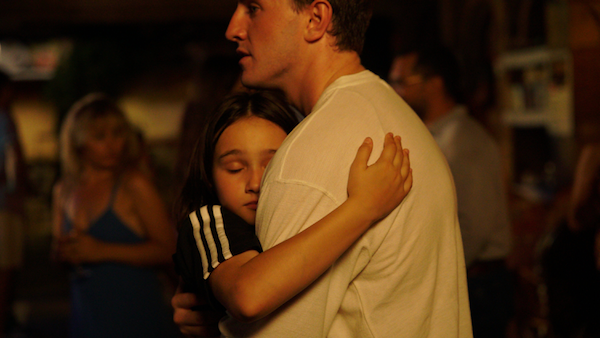Movie review by Greg Carlson
Shimmering like a mirage that retreats and dematerializes the closer one gets, “Aftersun” may just be the best movie of 2022. The self-described “emotionally autobiographical” feature debut of Scottish writer-director Charlotte Wells, the film is a treasure for those viewers who prefer ambiguity and understatement. The deceptively straightforward story follows the low-key father-daughter holiday of 11-year-old Sophie (Frankie Corio) and about-to-turn-31 Calum (Paul Mescal). Their vacation at a seaside resort in Turkey, filled with seemingly carefree time in the swimming pool, billiards and arcade games, moonlight dining, and DJs spinning the hits of the late-90s period at dance parties, veil feelings of frustration and darkness that trouble Calum.
Despite just a small handful of student films completed during her time in NYU’s graduate film program, Wells demonstrates the confidence and command of a veteran storyteller. “Aftersun” has drawn multiple comparisons to the cinema of fellow Scot Lynne Ramsay in both thematic and stylistic approach – a genuine compliment to the emerging talent. The filmmaker has acknowledged the influence of Chantal Akerman, Edward Yang, Todd Haynes, Sylvia Chang, and Barry Jenkins (who served as an “Aftersun” producer). Wells is certainly no slavish imitator, though. She constructs her very own universe with an eye and ear for the particular and the unique.
“Aftersun” joins a short list of films that successfully use the father-daughter relationship as a means to examine the liminal state between childhood and adolescence as well as the inevitable recognition of flawed personhood that manifests once we begin to see a parent as an individual. “To Kill a Mockingbird,” “Paper Moon,” and “Leave No Trace” are just three examples that explore different dynamics unique to childrearing. And despite the obvious differences in depictions of wealth and privilege, “Aftersun” rhymes with key aspects of Sofia Coppola’s beautiful “Somewhere.” In one similarity, both Calum and Stephen Dorff’s Johnny Marco are encumbered with casts while they nurse broken bones back to health.
Those parallel rhetorical signifiers in the two movies suggest splintering and fragmentation beyond the physical circumstances that necessitated trips to the emergency room, and both daughters will, in ways particular to their circumstances, grapple with the unfair burden of looking after the dads. Wells and Coppola are also both deeply invested in the observational. In “Aftersun,” camcorder footage links past and future and glimpses of Calum as imagined by the grown-up Sophie (Celia Rowlson-Hall) strobe in a haunting dreamscape motif.
Wells distances Calum from both Sophie and the viewer, dropping hints throughout the narrative regarding the extent of his depression and an unspoken inclination to self-harm. With director of photography Gregory Oke, Wells often chooses to partially obscure Calum, framing him in compositions that hide or cut off our view of the whole. The cumulative effect is potent, even heartbreaking. Several scenes qualify as moments out of time: a lost diving mask, a visit to a rug merchant, a karaoke performance, a spine-tingling application of “Under Pressure.” All these and many others charge “Aftersun” with a quiet devastation and poignance that linger long after the film ends.
